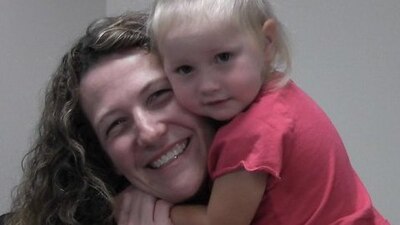In the first case of its kind in Colorado, a former Jefferson County teacher has won an undisclosed cash settlement and concessions from the school where she said she lost her job for taking breaks to pump her breast milk.

Under the 2008 Colorado Nursing Mothers Act, breastfeeding mothers in Colorado are entitled to take time in a private location to express milk at work. Colorado is one of 24 states with laws that support breastfeeding mothers in the workplace. The right to pump milk at work is also now guaranteed under the federal Affordable Care Act.
Heather Burgbacher held her daughter, Dreya, who is now 2 and said the dark days she endured while fighting back are now worthwhile. The American Civil Liberties Union of Colorado and the national ACLU fought the case on Burgbacher’s behalf.
“It was a very difficult road. I felt like a failure. I felt like I had done something wrong. It was devastating to have my career taken away from me,” Burgbacher said. “I’m just proud that we’re taking steps forward, changing for the good. Now people will be aware of what we need. Ignorance of the law was a big part of this.”
Officials at the school, Rocky Mountain Academy of Evergreen, said Tuesday they “strongly disagree” with the ACLU’s claims and that they already were compliant with the law when Burgbacher’s job was eliminated due to organizational restructuring.
“It’s unfortunate that the ACLU chose to target the Rocky Mountain Academy of Evergreen to boast the ‘first public settlement of a lawsuit regarding the Nursing Mothers Act’. Especially in light of the fact that the plaintiff’s accusations were false, and that she was accommodated by the school in terms of time and space to express breast milk in accordance with the law and with RMAE’s policies and procedures around this issue,” said Dan Cohen, the school’s executive director.
“It appears that the ACLU may have been a bit over anxious to make a statement regarding this relatively new law, and our school was the unfortunate target,” Cohen added.
A lauded technology teacher for five years at the charter, Burgbacher said she had arranged for a fellow teacher to supervise her students while she took 20-minute breaks about three times each week to pump her milk for Dreya, the younger of her two daughters.
Burgbacher said she was told in February 2011 that her contract wouldn’t be renewed the following year. She said then that her supervisor cited disputes over her desire to pump milk as the cause for her dismissal.
“I was told, ‘Welcome to the school of hard knocks,’” Burgbacher said Tuesday as she and her lawyers announced the settlement. “I wasn’t willing to accept that. If you feel you have been wronged, then definitely explore it. Don’t be afraid to speak up to your HR person … if you’re facing issues that need to be investigated further.”
Officials at the charter school said the decision not to renew her contract had nothing to do with the pumping breaks she had sought. The school and Jefferson County Public Schools, the district authorizing the charter, did not admit any fault in the settlement and agreed to give Burgbacher positive letters of reference. Burgbacher has since found another job.
ACLU lawyers said the school has agreed to multiple concessions for future nursing mothers, including:
- Full compliance with the Colorado Nursing Mothers Act
- Written notice to employees regarding their rights under the law
- A private location where mothers can express their milk
- Notice to future employees who have filed harassment claims about the outcomes of any investigations
Burgbacher’s attorneys, Rebecca Wallace of the ACLU and Mari Newman of the law firm Killmer, Lane and Newman, both said Burgbacher’s case could help codify rights for other working mothers who want to pump at work in order to preserve their milk supply.
“This case serves as a real model for employers in Colorado that they can accommodate working mothers. The law simply doesn’t allow for discrimination,” Newman said. “This case certainly isn’t unique. Discrimination against working mothers certainly persists. This is just one of many examples of that.
“What’s significant about this is the efforts that the school has now made to accommodate future nursing mothers,” Newman said.
Until now, Wallace, a staff attorney with the ACLU, said the 2008 Colorado law had not been tested.
“The primary reason for taking the case, both for the ACLU and for Heather was to do public education and to teach employers what their responsibilities are and to teach employees how to stand up for their rights,” Wallace said.
Along with the ACLU, Burgbacher said she received help from local leaders of the breastfeeding support group, La Leche League International, and experts on breastfeeding and public health at the Colorado Department of Public Health and Environment.
Burgbacher said she was pumping her milk in hopes of giving Dreya the healthiest start in life that she could.
“I wanted to get to a year. I try to be a hands-on mom,” Burgbacher said.
She believes breastfeeding is healthier for babies and said her older daughter, now 4, has never had an ear infection, for example.
“I saw the benefits (of breastfeeding). I wanted that to be the same for this one,” she said. “I know it’s important, not only for them physically, but also for the bond you establish.”
Burgbacher said employers should support mothers who breastfeed their babies.
“Do what you can to retain your valued employees. Breastfeeding is a huge commitment,” she said. “It’s a selfless act that needs support from everyone, your family, your spouse and your employer.”
